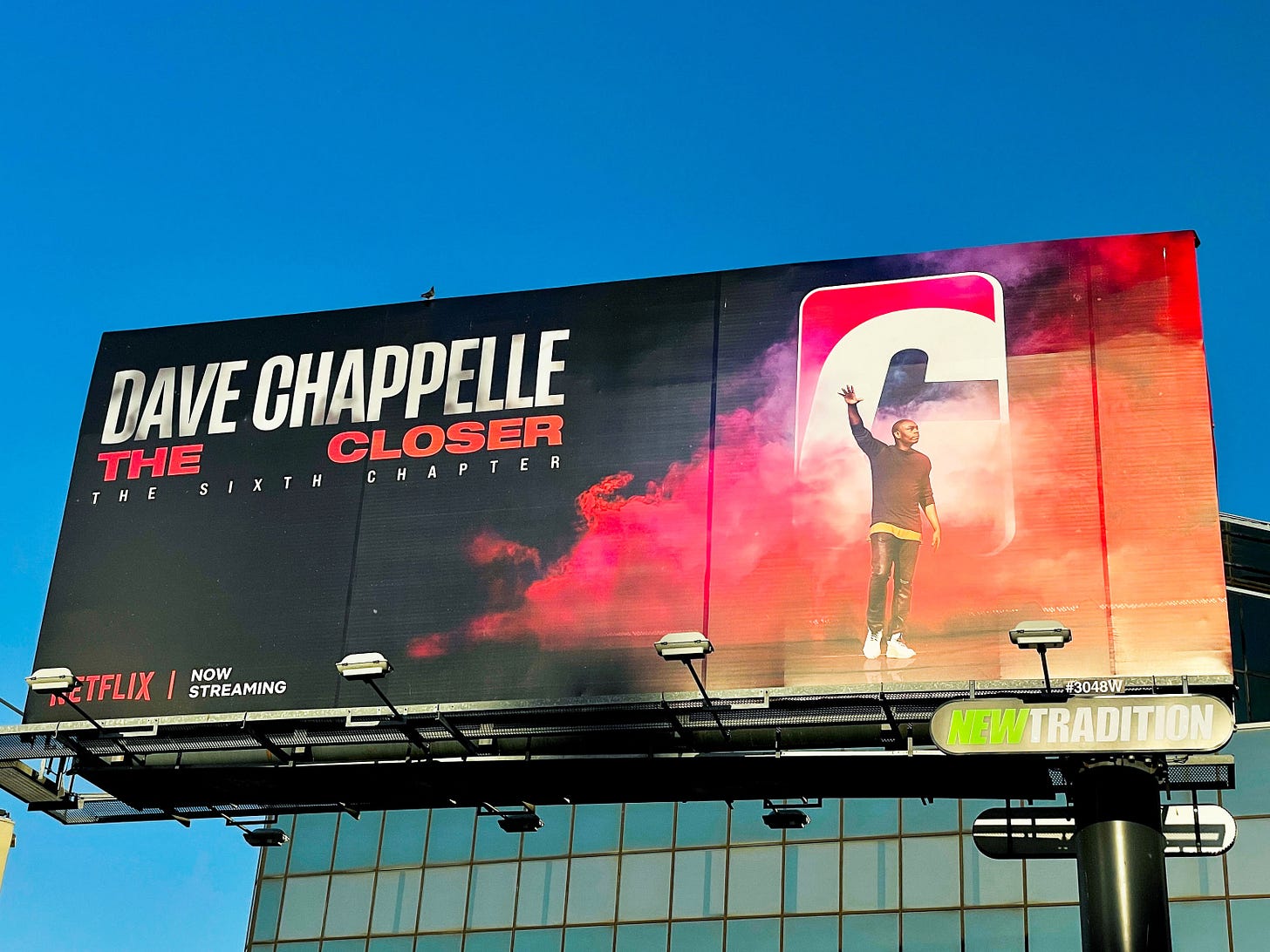Commercial Interests Aren’t Enough To Save Free Speech
Netflix defended Dave Chappelle because it happened to serve its bottom line. But a real commitment to free speech can’t turn on commercial incentives.
Dave Chappelle’s latest stand-up special pushed a lot of buttons. Over The Closer’s 72 minutes, Chappelle makes off-color jokes about Jewish people, black people, white people, and gay people. The group he dedicates the core of the show to jabbing, however, is transgender people. It’s understandable that some took offense, and it’s not surprising that activists quickly demanded that Netflix take it down.
Reasonable people can disagree about the content of Chappelle’s special—whether it was funny and whether he took his jokes too far. But the instinct to censor and remove any piece of art, especially one as widely popular as The Closer, is wrongheaded. Free expression is a fundamental aspect of liberal democracy. Especially in the inherently boundary-pushing arenas of art and comedy, we should embrace a culture that allows performers to take big risks—whether or not we happen to like the result.
American life has settled into a predictable pattern. As soon as the would-be censors arrive, the country’s major institutions buckle to their demands. Over the past years, TV episodes have been scrubbed from streaming services, books removed by retailers, and lectures canceled at universities. It is, by now, a welcome surprise when an institution refuses to give in to such demands.
One such surprise came last week in the form of a company-wide memo from Netflix co-CEO Ted Sarandos in which he forcefully rejected demands to remove The Closer:
Chappelle is one of the most popular stand-up comedians today [...] his last special “Sticks & Stones,” also controversial, is our most watched, stickiest and most award winning stand-up special to date. As with our other talent, we work hard to support their creative freedom—even though this means there will always be content on Netflix some people believe is harmful […] We don’t allow titles on Netflix that are designed to incite hate or violence, and we don’t believe The Closer crosses that line. I recognize, however, that distinguishing between commentary and harm is hard, especially with stand-up comedy which exists to push boundaries. Some people find the art of stand-up to be mean-spirited but our members enjoy it, and it’s an important part of our content offering.
Netflix’s professed commitment to creative freedom deserves praise. But as Sarandos’ statement makes clear, the company seems to be defending The Closer, in good part, because it has a financial incentive to do so. The same could be said for Spotify’s decision to continue hosting Joe Rogan’s podcast, which gets 11 million downloads per episode, after activists called for it to be taken down.
It’s gratifying when what’s good for business is good for free expression. And that makes it tempting to let the defense of free speech rest on popular opinion or commercial incentives: “As long as the market rules, liberal values shall endure!”
But profit incentives can be fleeting, and it would be naive to think that they will always point towards upholding open discourse. Indeed, some of our most important knowledge-building institutions—including academia and journalism—face fundamentally illiberal market pressures.
As Sahil Handa argued in the pages of Persuasion, incentives in these elite institutions often cause them to “treat due process and open inquiry as values that can be sacrificed.” That’s why it’s concerning, but not especially surprising, when The New York Times pushes journalists who prove controversial out of the newsroom or the University of North Carolina denies tenure to Nikole Hannah-Jones, seemingly at the behest of a powerful conservative donor. If the market incentives happen to change, Netflix may well do the same in the future.
By all means, let’s rejoice when profit incentives and the defense of free expression happen to align. But don’t convince yourself that business interests will always, or even usually, be a sufficient bulwark against illiberalism. Ultimately, a principled commitment to free speech is the only true safeguard against censorship.
Seth Moskowitz is an associate editor at Persuasion.




Nikole Hannah-Jones doesn't *deserve* tenure. She hasn't earned it. She doesn't have a Ph.D. and her hack journalism and so-called "history" writing has been discredited by a number of reputable scholars. People like that don't get tenure, and if she did *that* would be the travesty. She'd be getting it because of her name recognition, not her ability to contribute to human knowledge.
I've been really hoping that other companies will see Netflix stand up to the storm, and refuse to give in; and came out okay. If corporate executives start to realize that this is just a toddler throwing a tantrum, and you must just ignore them until they get tired and stop screaming, then the woke movement will lose huge amounts of power. Perhaps Netflix's motivations weren't purely altruistic, but I still hold out hope that they could have such an effect anyway.